|
|
|
Sort Order |
|
|
|
Items / Page
|
|
|
|
|
|
|
| Srl | Item |
| 1 |
ID:
083844


|
|
|
| 2 |
ID:
145085
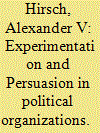

|
|
|
|
|
| Summary/Abstract |
Different beliefs about how to achieve shared goals are common in political organizations such as government agencies, campaigns, and NGOs. However, the consequences of such conflicts have not yet been explored. We develop a formal model in which a principal and an agent disagree about the right policy for achieving their shared goals. Disagreement creates a motivational problem, but we show how both observing policy outcomes and experimenting with policies can ameliorate it. We also show that the principal often defers to the agent in order to motivate him, thereby generating more informative policy outcomes and building future consensus. Most surprisingly, she sometimes allows the agent to implement his desired policy even when she is sure it is wrong, to persuade him through failure that he is mistaken. Using the model, we generate empirical implications about performance measurement and Presidential appointments in U.S. federal agencies.
|
|
|
|
|
|
|
|
|
|
|
|
|
|
|
|
| 3 |
ID:
138070
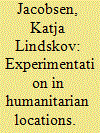

|
|
|
|
|
| Summary/Abstract |
Amid good intentions, such as providing humanitarian assistance to refugees, the use of biometric technology in humanitarian refugee management may entail various risks for the implicated refugee populations. Drawing on insights from science and technology studies, this article introduces a distinction between risks stemming from technology failure and risks stemming from successful uses of biometric technology. The article thus departs from the literature in which technology failure has been in focus by showing that analysing the effect of technology success adds an important dimension to our analysis of the range of risks that may emerge in the context of humanitarian technology uses. The usefulness of this distinction is then illustrated through an analysis of the use by the United Nations High Commissioner for Refugees (UNHCR) of iris recognition in the repatriation of Afghan refugees; besides risks of failure at the implementation stage, risks also emerged once refugees had successfully registered their biometric data with UNHCR. To recognize how humanitarian refugee biometrics produces digital refugees at risk of exposure to new forms of intrusion and insecurity, we need to appreciate how successful technology can have critical implications arising from how technology is constituted in and constitutive of social phenomena.
|
|
|
|
|
|
|
|
|
|
|
|
|
|
|
|
| 4 |
ID:
132947
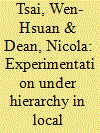

|
|
|
|
|
| Publication |
2014.
|
| Summary/Abstract |
Reforms carried out by the Chinese Communist Party (CCP) have long followed a traditional model of "experimentation under hierarchy." This article will attempt to develop this model further by building a framework to illustrate the influence of both the political dynamics of hierarchical central-local relations and local economic circumstances in the introduction of large-scale political reforms. The initiation and expansion of "experimental points" are only permitted in those select few provinces with both favourable political and economic local conditions, allowing the CCP to minimize risk and make informed decisions regarding possibilities for nationwide reform. This article proposes that the hierarchical interaction of central and local political elites, and in particular provincial secretaries, can explain the extent of reforms, whereas the type of reform is linked to distinct provincial economic conditions and the provincial secretary's interpretation of provincial priorities. Put succinctly, the CCP's model of political reform can be specifically characterized as "experimentation under hierarchy in local conditions." This article presents a detailed discussion of both the political and economic considerations inherent in this concept, and provides examples of reform programmes in Guangdong and Sichuan to illustrate the model in practice.
|
|
|
|
|
|
|
|
|
|
|
|
|
|
|
|
| 5 |
ID:
185828


|
|
|
|
|
| Summary/Abstract |
Will AI-enabled capabilities increase inadvertent escalation risk? This article revisits Cold War-era thinking about inadvertent escalation to consider how Artificial Intelligence (AI) technology (especially AI augmentation of advanced conventional weapons) through various mechanisms and pathways could affect inadvertent escalation risk between nuclear-armed adversaries during a conventional crisis or conflict. How might AI be incorporated into nuclear and conventional operations in ways that affect escalation risk? It unpacks the psychological and cognitive features of escalation theorising (the security dilemma, the ‘fog of war’, and military doctrine and strategy) to examine whether and how the characteristics of AI technology, against the backdrop of a broader political-societal dynamic of the digital information ecosystem, might increase inadvertent escalation risk. Are existing notions of inadvertent escalation still relevant in the digital age? The article speaks to the broader scholarship in International Relations – notably ‘bargaining theories of war’ – that argues that the impact of technology on the cause of war occurs through its political effects, rather than tactical or operational battlefield alterations. In this way, it addresses a gap in the literature about the strategic and theoretical implications of the AI-nuclear dilemma.
|
|
|
|
|
|
|
|
|
|
|
|
|
|
|
|
| 6 |
ID:
169854
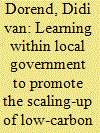

|
|
|
|
|
| Summary/Abstract |
Local governments are experimenting with low-carbon initiatives (LCIs) to learn how the transition to low-carbon cities can be advanced. However, little is known about how local governments can capitalize on what has been learned and use it to accelerate scaling-up processes. This paper explores the complex relationship between LCIs and learning processes at the level of local government. The issue is examined through an explorative embedded case study in the City of Copenhagen, a sustainability frontrunner. The paper makes three contributions that enrich literature and practice concerning climate governance for sustainability transitions. First, it offers an overview of two types of knowledge that can be derived from LCIs to accelerate scaling-up processes: instrumental and transformative knowledge. Second, the paper provides a concrete overview of learning practices for governing learning processes within local government. Local governments can learn from LCIs through four categories of practice: experience accumulation, knowledge articulation, knowledge codification, and knowledge distribution. Finally, the paper offers an overview of explanatory factors related to the motivation, resources, and skills that influence a local government's capacity to learn from LCIs. The findings particularly highlight the importance of setting a mandate for experimenting with and evaluating LCIs.
|
|
|
|
|
|
|
|
|
|
|
|
|
|
|
|
| 7 |
ID:
142793
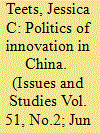

|
|
|
|
|
| Summary/Abstract |
In this article, I address the puzzle of what motivates local officials in China to do something new—create a new policy, launch a pilot, adopt an experimental policy—especially when such innovation has uncertain outcomes. Despite the uncertainty and risk, we observe a great deal of policy innovation, both the creation and adoption of experiments, at the subnational level in China. In this article, I explore local policymakers' incentives regarding innovation to understand why they experiment with new policies under conditions of political risk and uncertainty. I utilize data from existing studies on policy innovation, including the Local Gov-ernance Innovation Awards (中國地方政府創新獎), to conduct this analysis.
|
|
|
|
|
|
|
|
|
|
|
|
|
|
|
|
| 8 |
ID:
185827
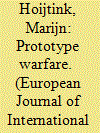

|
|
|
|
|
| Summary/Abstract |
In recent years, the concept of ‘prototype warfare’ has been adopted by Western militaries to accelerate the experimental development, acquisition, and deployment of emerging technologies in warfare. Building on scholarship at the intersection of Science and Technology Studies and International Relations investigating the broader discursive and material infrastructures that underpin contemporary logics of war, and taking a specific interest in the relationship between science, technology, and war, this article points out how prototype warfare captures the emergence of a new regime of warfare, which I term the experimental way of warfare. While warfare has always been defined by experimental activity, what is particular in the current context is how experimentation spans across an increasingly wide range of military practices, operating on the basis of a highly speculative understanding of experimentation that embraces failure as a productive force. Tracing the concept of prototype warfare across Western military discourse and practice, and zooming in on how prototype warfare takes experimentation directly into the battlefield, the article concludes by outlining how prototype warfare reconfigures and normalises military intervention as an opportunity for experimentation, while outsourcing the failures that are a structural condition of the experimental way of warfare to others, ‘over there’.
|
|
|
|
|
|
|
|
|
|
|
|
|
|
|
|
| 9 |
ID:
179969
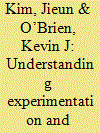

|
|
|
|
|
| Summary/Abstract |
Studies of local governance in China often point to nimble experimentation but problematic implementation. To reconcile these competing images, it is useful to clarify the concepts of experimentation and implementation and see how they unfolded in one policy area. The history of China’s Open Government Information (OGI) initiative shows that the experimentation stage sometimes proceeds well and produces new policy options, but may falter if local leaders are unwilling to carry out an experiment. And the implementation stage often poses challenges, but may improve if the Center initiates new, small-scale experiments and encourages local innovation. This suggests that the experimentation and implementation stages are not so different when officials in Beijing and the localities have diverging interests and the Center is more supportive of a measure than local officials. The ups and downs of OGI, and also village elections, can be traced to the policy goal of monitoring local cadres, the central–local divide, and the pattern of support and opposition within the state.
|
|
|
|
|
|
|
|
|
|
|
|
|
|
|
|
| 10 |
ID:
149370
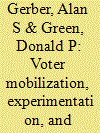

|
|
|
|
|
| Summary/Abstract |
Field experiments on voter mobilization enable researchers to test theoretical propositions while at the same time addressing practical questions that confront campaigns. This confluence of interests has led to increasing collaboration between researchers and campaign organizations, which in turn has produced a rapid accumulation of experiments on voting. This new evidence base makes possible translational works such as Get Out the Vote: How to Increase Voter Turnout that synthesize the burgeoning research literature and convey its conclusions to campaign practitioners. However, as political groups develop their own in-house capacity to conduct experiments whose results remain proprietary and may be reported selectively, the accumulation of an unbiased, public knowledge base is threatened. We discuss these challenges and the ways in which research that focuses on practical concerns may nonetheless speak to enduring theoretical questions.
|
|
|
|
|
|
|
|
|
|
|
|
|
|
|
|
|
|
|
|
|